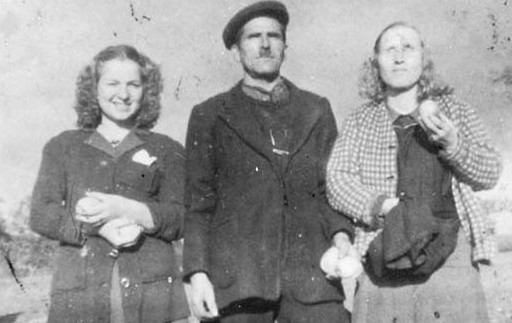Vanga's Mysterious Life Story - Part 3: Student at School of the Blind
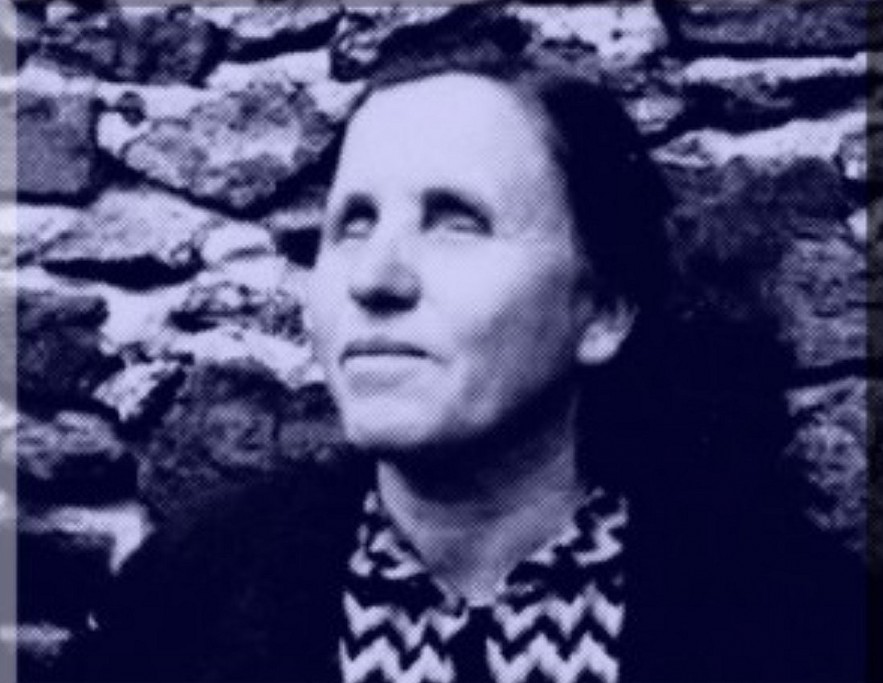 |
| Young Vanga |
| Contents |
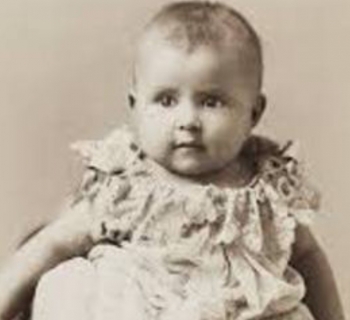 Vanga's Mysterious Life Story - Part 1: Childhood and Family Vanga's Mysterious Life Story - Part 1: Childhood and Family |
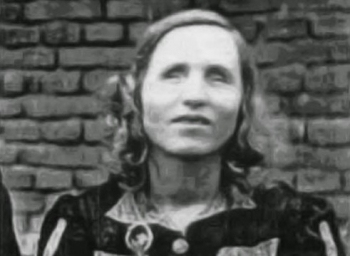 Vanga's Mysterious Life Story - Part 2: Unhappy and Blind Youth Vanga's Mysterious Life Story - Part 2: Unhappy and Blind Youth |
Vanga's First Love and Engagement
At the School of the Blind, Vanga had to fend for herself. Her family's miserable life and unhappiness fell on her head, not allowing her to reveal her jovial personality.
Everything here is different. Vanga was dressed in a beautiful school uniform, which, as she felt, consisted of a brown pleated skirt and a jacket with a sailor-style collar. She wears beige shoes. Her chestnut hair is neatly trimmed and in a beautiful bun. Although she cannot see her beauty, she can touch and caress her new clothes for a long time. Pride and happiness filled her soul that had suffered much.
Life in a new place is exciting, although a strict schedule is required.
In the morning, students have to go to class, they learn to read and write in the Braille alphabet, allowing touching with hands instead of eyes. The children also learned many other things, but Vanga liked music the most. She has a great musical sense, and learns to play the piano fairly quickly. The music seemed to take her back to her familiar homeland, where the four seasons were green and the sun shining brightly, the front yard where the kids played catch or she told them about. listen to his stories. This cheerful tune reminded her of the murmur of the Trakayna River not far from their city. It's a pity that these wonderful hours have passed so quickly.
Then the practical classes begin. The girls learn to cook and clean the house. At first Vanga faced many difficulties: even how to cook soup, or porridge, was a difficult task for her, but gradually she acquired the skill. It seems that she learned to "see" with her hands. Her fingers became soft and sensitive, she even mastered the use of objects such as knitting needles and sewing needles. Vanga absorbed the lesson very quickly, and all the teachers were satisfied with her academic performance.
Vanga has integrated into a new life. Three years passed quietly, and she turned 18 years old. She was an excellent student and achieved many achievements. This school helped her regain her balance and find joy in life. She has a lovely appearance, and her delicate face seems to be illuminated by an inner light.
Vanga treats all of her friends fairly well, but lately she's been caught up with the idea that she likes to hear Dimitr's pleasant voice and be near him. She couldn't understand what was happening to her. When she heard him, her heart began to beat faster and her cheeks suddenly turned red.
The rare moments spent together brought both so much happiness and holy joy, making them want to be closer to each other again.
Once, Dimitr confessed that he loved her and asked her to be his wife. He himself comes from the village of Giaoto in the Gevgelia district. His parents are rich people. They realize the sincere affection of the young couple and take the responsibility of taking care of their future. Vanga completely changed. She seemed to be happy with wings. She had plans for the future, she envisioned her magical wedding, of her appearing before the guests in a lavish outfit: a long white dress and a veil. Then how happy her father and relatives would be. She informs her father about Dimitr's engagement and asks for his blessing. The days of waiting dragged on.
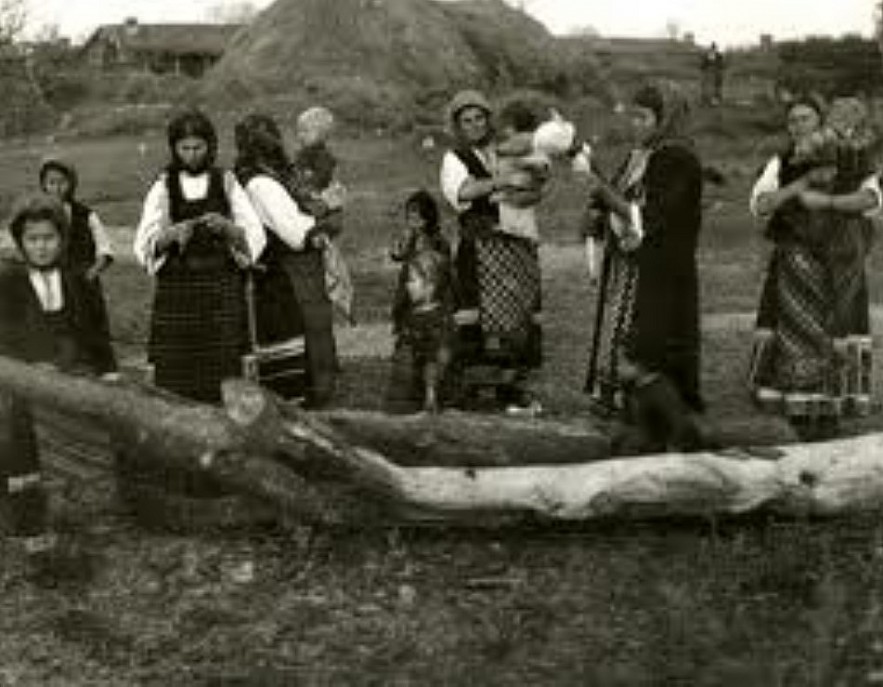 |
| Vanga was a student at the school for the blind |
Difficulties, Challenges for Family
But life turns out differently. The news from Strumitsa arrived that made Vanga very shocked. Mrs. Tanka died giving birth to her fourth child. The father is left alone with his children without any help or support. Vanga was forced to go home to look after the children and do housework.
Vanga could not help but listen to her father and leave her loved ones to fate. With no other choice, she sadly bid farewell to her school, her first love, and her hope for a better life.
Vanga understands that the best years of her life at the School of the Blind will never be repeated.
At home, Vanga witnessed extreme poverty. The younger brothers were emaciated, weak from hunger and disease. Her heart tightened at the thought that these little children had become orphans. Vasil is 6 years old, Tome is 4 years old, and the youngest Lubka is 2 years old.
Now she is everything to the children – both a mother, a housewife, and a protector. That thought gave her strength to overcome any adversity.
After Vanga returned, his father went to find a job in the neighboring villages.
But the misfortunes still did not let them go. The Chirpan earthquake of 1929 covered the entire Strumitsa area. Its epicenter was quite strong, but fortunately, no one in Mr. Pande's family was injured, only their house collapsed, and the family fell into the sky.
Mr. Pande immediately took care of the new place. After a few days, he built a house with thatched roofs and walls. Because the furniture was almost empty, they moved to a new place very quickly. At first, the house had only one room, later it was expanded, adding a kitchen and a toaster oven, of course there was nothing to bake.
Vanga strives to create coziness in the new accommodation. In this house, Vanga and Lubka lived for many years, the younger brothers did not live long here. Mr. Pande cannot support his family alone. And in order to support their father, Vasil and Tome also had to find jobs throughout the villages.
Blind Vanga works for money
Vanga tried to use all the skills learned at the School of the Blind. She knitted very beautifully and quickly, so after a while people came to order. In lieu of wages, they gave her knick-knacks or old sweaters. She took these old shirts off and knitted them for the children to wear because she couldn't afford to buy new ones.
The kind neighbors saw that Vanga had worked hard to raise the children, taking care of food, clothing, and even herself. And they brought the clothes of dead women for Vanga to wear.
Vanga learned more about weaving, from morning to night in the house resounded the loom. Usually Vanga weaves clothes until late at night, crying in despair as she works. During the day she restrained herself so as not to frighten Lubka, but at night she gave herself up, and tears were her only means of venting her suffering.
In the morning the endless work begins again. They get up very early. Vanga herself never refuses to sit idle and does not allow anyone to be lazy. She tries to keep her house neat and tidy.
All jobs are arranged by day of the week. For example, Monday is for laundry, Tuesday- cleaning the yard, Wednesday- fixing clothes.
Lubka was very young, but could not rely on anyone. Vanga taught her to do housework and was very strict.
Lubka was forced to sew. Vanga touched the seam, and if she saw that the seam was not careful, she took it off and asked Lubka to sew it again.
Lubka always had tears in her eyes, because she had to fix a lot of clothes and couldn't go out to play with her friends. Vanga, even though she loves you very much, she has to be resolute. Everything needs to be done, she thinks.
On Thursdays, the sisters knead the bread dough. Sixth, they go to the suburbs to dig red clay and plaster the walls inside the house, and outside, they put black stones around to make it beautiful. On Saturday, they go to the fields to pick vegetables to eat. On Sunday, the sisters go to church.
Try Being 'The Prophet'
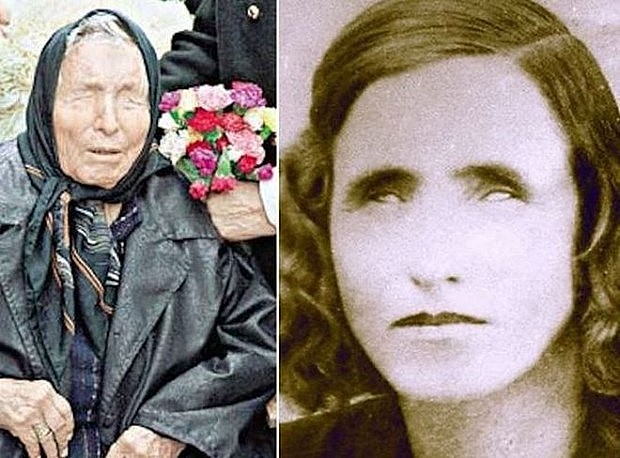 |
| The publication recalls that Baba Vanga (according to the passport from 1953 - Vangya Pandeva Guscherova) was born in Strumica in 1911 and spent most of her life in Rupite, Petrichko, in Kozhuh mountain and died on August 11, 1996 in Sofia. |
On Sundays, after lunch, neighbors gather in the yard to chat or entertain; Women from neighboring villages also come here to ask Vanga to weave clothes.
Vanga is an interesting and shrewd interlocutor who loves to chat with her.
In the Strumitsa region there is an interesting custom. The evening before St. George's Day (May 6 according to the new calendar), the girls drop into the crock pot a personal item to "try their luck". Neighboring girls often put earthenware pots in the middle of Vanga's yard under the crimson perennial rose bushes. Usually, possibly because of blind love for Vanga, she is often chosen as "the oracle". She takes out the objects and predicts the fate of the girls. These predictions often come true, but no one, not even Vanga or the girls, at that time thought that something was out of the ordinary.
On the Feast of the Fortieth Martyrs, girls predict fate by placing tree branches (as "bridges"), hoping that nightfall will meet in their dreams their fiancé from the other shore. The next morning, the girls rushed to Vanga, and told them about their dreams. Furthermore, when interpreting dreams, Vanga often goes beyond their content; She also talked about what she didn't need to know—about each of them's deepest secrets. The girls were surprised, but that was all.
However, happy holidays are rare. Vanga often faces the question: "How to feed the family?" Because poverty clings to them not to leave. The struggle for survival was fierce.
They mostly eat tortillas, wild cabbage or diluted yogurt, but are also rare and generally fasting.
Once, when there was nothing left to eat in the house, the father asked one of his well-known acquaintances, whom he considers a close friend, to help him with some flour. He replied that he did not intend to give it away, but could sell a small bag of flour. Mr. Pande bought a sack of flour from his pocket and sent it back to Strumitsa for his children. Vanga kitchen group bakes bread. After baking, the sisters broke the hot bread to eat.
But after a while, Lubka and Vanga began to have stomachaches, then vomited. Terrified, the neighbors rushed to the next village to meet the father to report the news. Terrified, the father ran home, tasted the flour and realized that his friend had sold him not barley flour but powder of a very poisonous plant.
That's the "friend" help.
However, children are still children, they are always daydreaming, asking their father to buy one thing after another. The father never refused, only promised to buy gifts, when the cherry season was harvested. The six cherry trees the children had hoped for were planted in a small suburban garden by the river Trakayna. When the cherries were ripe, the father picked them and sold them to street vendors, but the proceeds were so meager that he had to ask for an appointment next year.
Then they tried growing tobacco. The whole family takes care of the seedlings from morning to night, but the money from selling tobacco is only enough to buy a pot and some wonton noodles.
In 1934, Lubka turned 8 years old, and went to school. Although life is very difficult, she is the best in her class. Vanga is very happy and proud of her sister's academic achievements.
Through her own experience, she knows how useful it is to study at the School for the Blind. The boys' situation was different. They work day-to-day in other villages, so they don't have the opportunity to study regularly. But even if they do nothing, they don't go to school. And if in all other things, the boys are obedient to Vanga, in their studies, they are like water and fire.
From year to year, their hard livelihood continues. Although exhausted and tired, Vanga is still the strongest and most resilient person in the family. She never allowed herself to complain of poverty in front of her children, and became a support not only for them but also for her father who was completely devastated by poverty, humiliation, anguish, and many other things. in despair. Vanga greatly comforted and encouraged her father, and predicted better days.
Looking for treasure to escape poverty
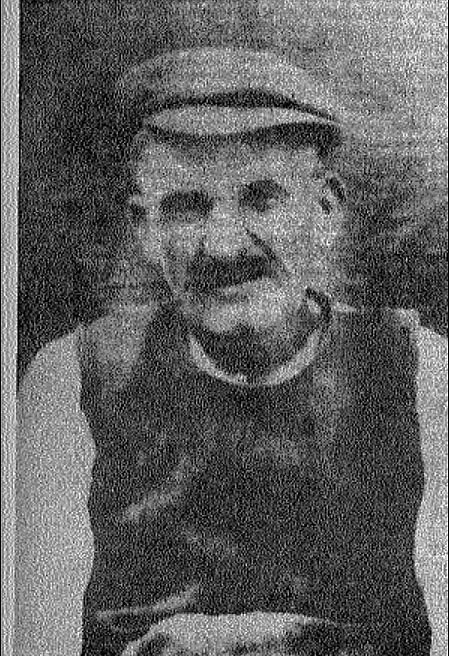 |
| Vanga's Father - Pande Surchev |
Unable to escape the situation of daily life without meals, the father had the intention of getting rich quickly by searching for treasure.
Once, Vanga told her father that she knew of a place where such a treasure was buried, and described the location not far from Strumitsa: a deserted village, beside a river and a small forest. Between the river and the forest emerged a sharp, serrated rock, and under this rock, according to Vanga's description, money was buried. The father was surprised and sighed incredulously.
Vanga still frowned and didn't say a word. The father became awkward. Thinking for a moment, he figured it could happen. The village called Rayantsy was abandoned by the villagers after a plague, and never returned. It lies on the bank of a small river, indeed, there is a forest and a rock. The father asked Vanga how she knew the place, and she replied that she had dreamed. So he asked Vanga to go to Ryantsy to try his luck.
The whole family is on the road. Lubka recalls that Vanga orientated very confidently, seemed to have been here many times, and all was as she described it.
They followed the riverbank below the rock, and the father decided to come back later, carrying a shovel to try his luck.
But then he fell and broke his arm. Then the river was blocked to make a cistern. Even if there is a real money jar buried there, it will forever be submerged under water. And the dream of getting rich is shattered.
Soon, one of the sheep in Mr. Pande's flock, got lost. The father returned home with great anxiety because he had nothing to compensate, he was afraid of being fired and his family would starve to death. At that moment, the blind daughter came out to help him.
Vanga said that the lost sheep is currently being shepherded by someone named Atanac in the village of Monospitovo. And she described his appearance in detail. The father was extremely surprised because even he did not know that person, let alone Vanga because she never stepped out of the house. But anyway, he still found his way to that village, and indeed found the lost sheep in the herd of sheep that Vanga described.
Taking the sheep home, he began to ask his daughter how she knew that, and Vanga replied that she had dreamed. She often sadly repeats over and over that she dreams of troublesome things, and then comes true.
In the cold season, their life is even more miserable. They mostly warmed themselves with pine needles picked by the two sisters on the edge of the city. But the pine needles also run out quickly, and they can't always be picked up. Furthermore, their thatched-roof house was draughty.
The poorest families in Strumitsa on New Year's Eve receive a small subsidy from the commune, but receiving this allowance is not easy. Vanga and Lubka had to stand in line for a week in front of the town hall. Sometimes Vanga stood barefoot for hours on the freezing cement floor, causing her legs to bruise from the cold.
Although physically fit, in 1930, Vanga fell ill with pleurisy. For nearly 8 months, her life was like a hair hanging. Lubka took great care of her sister. But Vanga's health is getting worse and worse. She was completely exhausted, and on sunny days, Lubka carried her out into the street like a child.
In 1939, during an election campaign, the masses began to express their displeasure with the policies of the Bulgarian Government, which was close to Germany. Mass demonstrations and strikes broke out in succession. A wave of arrests followed.
Among those arrested was Mr. Pande: someone accused him of publicly declaring the dangers of such a course. The interrogation began again with the application of "extreme" measures. He was forced to give the names of people "joined in the struggle against the government". But then they found no evidence of Mr. Pande's guilt; he was set free.
When Mr. Pande returned home, his body was covered with bruises and bruises, and his soul was also wounded by mental scars. At 53 years old, he looks like an old man. The daughters took care of their father's wounds with folk remedies they could buy.
Still not fully recovered, Mr. Pande campaigned throughout the villages.
Early the next year, Lubka fell ill with meningitis. She was admitted to Shtip city hospital. The hospital has no space, I have to lie in the hallway. For two weeks Lubka fought for life with the god of death, but perhaps by fate she was cured.
Returning home, Lubka found Vanga completely exhausted, sick and helpless. When Lubka was away, no one ever came to the house, and Vanga did not eat or drink for many days. She is overjoyed that Lubka is back healthy and well.

